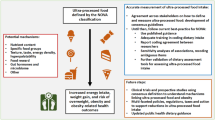Abstract
Objective: To investigate the dose-response relationship between cholesterol lowering and three different, relatively low intake levels of plant sterols (0.83, 1.61, 3.24 g/d) from spreads. To investigate the effects on lipid-soluble (pro)vitamins.
Design: A randomized double-blind placebo controlled balanced incomplete Latin square design using five spreads and four periods. The five study spreads included butter, a commercially available spread and three experimental spreads fortified with three different concentrations of plant sterols.
Subjects: One hundred apparently healthy normocholesterolaemic and mildly hypercholesterolaemic volunteers participated.
Interventions: Each subject consumed four spreads, each for a period of 3.5 week.
Results: Compared to the control spread, total cholesterol decreased by 0.26 (CI: 0.15–0.36), 0.31 (CI: 0.20–0.41) and 0.35 (CI: 0.25–0.46) mmol/L, for daily consumption of 0.83, 1.61 and 3.24 g plant sterols, respectively. For LDL-cholesterol these decreases were 0.20 (CI: 0.10–0.31), 0.26 (CI: 0.15–0.36) and 0.30 (CI: 0.20–0.41). Decreases in the LDL/HDL ratio were 0.13 (CI: 0.04–0.22), 0.16 (CI: 0.07–0.24) and 0.16 (CI: 0.07–0.24) units, respectively. Differences in cholesterol reductions between the plant sterol doses consumed were not statistically significant. Plasma vitamin K1 and 25-OH-vitamin D and lipid standardized plasma lycopene and alpha-tocopherol were not affected by consumption of plant sterol enriched spreads, but lipid standardized plasma (alpha+beta)-carotene concentrations were decreased by about 11 and 19% by daily consumption of 0.83 and 3.24 g plant sterols in spread, respectively.
Conclusions: The three relatively low dosages of plant sterols had a significant cholesterol lowering effect ranging from 4.9–6.8%, 6.7–9.9% and 6.5–7.9%, for total, LDL-cholesterol and the LDL/HDL cholesterol ratio, respectively, without substantially affecting lipid soluble (pro)vitamins. No significant differences in cholesterol lowering effect between the three dosages of plant sterols could be detected. This study would support that consumption of about 1.6 g of plant sterols per day will benefically affect plasma cholesterol concentrations without seriously affecting plasma carotenoid concentrations.
Sponsorship: Unilever Research Vlaardingen, NL
Similar content being viewed by others
Author information
Authors and Affiliations
Rights and permissions
About this article
Cite this article
Hendriks, H., Weststrate, J., van Vliet, T. et al. Spreads enriched with three different levels of vegetable oil sterols and the degree of cholesterol lowering in normocholesterolaemic and mildly hypercholesterolaemic subjects. Eur J Clin Nutr 53, 319–327 (1999). https://doi.org/10.1038/sj.ejcn.1600728
Received:
Revised:
Accepted:
Published:
Issue Date:
DOI: https://doi.org/10.1038/sj.ejcn.1600728
- Springer Nature Limited
Keywords
This article is cited by
-
Phytosterols and Cardiovascular Disease
Current Atherosclerosis Reports (2021)
-
The Medical 1H-MRS Analysis of Edible Vegetable Oils Rancidity: Focus on the Saturated/Unsaturated Fatty Acids (Bond) Change
Applied Magnetic Resonance (2017)
-
Plasma fat-soluble vitamin and carotenoid concentrations after plant sterol and plant stanol consumption: a meta-analysis of randomized controlled trials
European Journal of Nutrition (2017)
-
Consumption of a dietary portfolio of cholesterol lowering foods improves blood lipids without affecting concentrations of fat soluble compounds
Nutrition Journal (2014)
-
The effect of plant sterols on serum triglyceride concentrations is dependent on baseline concentrations: a pooled analysis of 12 randomised controlled trials
European Journal of Nutrition (2013)




